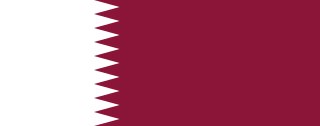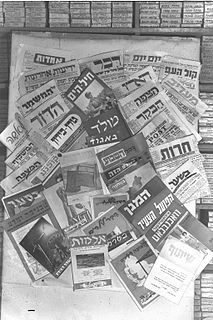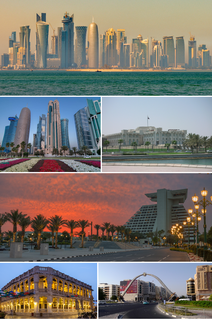
The political system of Qatar is either an absolute monarchy or a constitutional monarchy, with the Emir of Qatar as head of state and head of government. Under the 2003 constitutional referendum it should be a constitutional monarchy. Sharia law is the main source of Qatari legislation.

Qatar achieved full independence from the United Kingdom on 3 September 1971. Arab states were among the first to recognize Qatar, and the country gained admittance to the United Nations and the Arab League in the same year. Qatar established diplomatic relations with the Soviet Union, and Communist China in 1988. The country was an early member of OPEC and a founding member of the Gulf Cooperation Council (GCC). Qatar is a strategic ally of China, with relationship between the two countries growing stronger.
The Gulf Times newspaper was founded in 1978 as the first publication of the Gulf Publishing and Printing Company in the capital city of Qatar, Doha. It is one of three English language newspapers in the country. It is published by Abdullah bin Hamad Al Attiyah, the former deputy prime minister and the former head of the Emir's court. The current chairman of Gulf Times is Abdullah bin Khalifa al-Attiya, while the editor-in-chief is Faisal Abdulhameed al-Mudahka making the editor in charge K T Chacko.

Qatar, officially the State of Qatar, is a country located in Western Asia, occupying the small Qatar Peninsula on the northeastern coast of the Arabian Peninsula. Its sole land border is with neighbouring Gulf Cooperation Council (GCC) monarchy Saudi Arabia to the south, with the rest of its territory surrounded by the Persian Gulf. The Gulf of Bahrain, an inlet of the Persian Gulf, separates Qatar from nearby Bahrain.

The media of Israel refers to print, broadcast and online media available in the State of Israel. The country boasts dozens of newspapers, magazines, and radio stations, which play an important role by the press in political, social and cultural life and cater it to a modern, developed and literate society.
The culture of Qatar is strongly influenced by traditional Bedouin culture, with less acute influence deriving from India, East Africa and elsewhere in the Persian Gulf. The peninsula's harsh climatic conditions compelled its inhabitants to turn to the sea for sustenance. Thus, there is a distinct emphasis placed on the sea in local culture. Literature and folklore themes are often related to sea-based activities.

Doha is the capital and most populous city of the State of Qatar. It has a population of 956,460 (2015). The city is located on the coast of the Persian Gulf in the east of the country. It is Qatar's fastest growing city, with over 80% of the nation's population living in Doha or its surrounding suburbs, and it is also the economic centre of the country.
Al-Watan is a daily morning Arabic language political newspaper based in Doha, Qatar. The paper is one of the three Arabic newspapers in the country along with Al Raya and Al Sharq.

Al Jazeera Media Network(AJMN) is a Qatari state-funded global media conglomerate headquartered in Doha, Qatar. It is the parent company of Al Jazeera and its related networks. The chairman is Sheikh Hamad bin Thamer Al Thani. The acting director general is Dr. Mostefa Souag.
Television in Qatar is very much state-influenced and operated. Official Qatar TV began producing and transmitting its own programmes in 1970, with colour transmission since 1974. It had a monopoly on television audience until 1993, when Qatar Cablevision began broadcasting satellite channels. Since then, four other platforms went on air: ART/1st NET, Orbit, Star Select and Gulf DTH/Showtime. Despite the broadening of television offerings, Qatar TV remains popular among Qataris.

Ahmed bin Jassim Al Thani is a Qatari businessman, politician and a member of the royal family, Al Thani.
Al Raya is an Arabic daily newspaper published in Doha, Qatar. It is semi-official newspaper of the country and is one of the five leading Qatari dailies. As for Arabic dailies published in the country Al Raya is among the three major newspapers along with Al Sharq and Al Watan.
Al Arab was the first Arabic daily following the independence of Qatar. It was printed between 1972 and 1995 and was relaunched on 18 November 2007 as an e-newspaper which is based in Doha, Qatar.

Al Sharq is an Arabic and pro-government daily newspaper published in Doha, Qatar. The paper is one of the three leading Arabic newspapers in the country in addition to Al Raya and Al Watan.
The New Arab or Al-Araby Al-Jadeed is a pan-Arab media outlet headquartered in London. It was first launched in March 2014 as an online news website by Qatari company Fadaat Media. It went on to establish a daily newspaper in September 2014. In January 2015, Fadaat launched Al Araby TV Network as a counterweight to Al Jazeera, which is viewed by some to hold a pro-Muslim Brotherhood bias.
Nasser Al-Othman is a Qatari journalist and author. He formerly directed the Culture and Arts Department, a now-defunct governmental agency which supervised Qatar's cultural development. He also served as editor in chief of daily newspaper Al Raya and has been attributed with the creation of Qatar's first radio station.
Al Jazeera is a Qatari state-funded broadcaster in Doha, Qatar, owned by the Al Jazeera Media Network. Initially launched as an Arabic news and current affairs satellite TV channel, Al Jazeera has since expanded into a network with several outlets, including the internet and specialty television channels in multiple languages.
The Qatar diplomatic crisis began in June 2017, when Saudi Arabia, the United Arab Emirates, Bahrain, Egypt, the Maldives, Mauritania, Senegal, Djibouti, the Comoros, Jordan, the Tobruk-based Libyan government, and the Hadi-led Yemeni government severed diplomatic relations with Qatar and banned Qatari airplanes and ships from utilising their airspace and sea routes along with Saudi Arabia blocking the only land crossing.

Saudi Arabia–Qatar relations refers to the current and historical relationship between the Kingdom of Saudi Arabia and the State of Qatar. Prior to 2017, the two countries maintained cordial ties. Qatar was mainly subservient to Saudi Arabia in matters relating to foreign policy. Hamad bin Khalifa Al Thani's assumption of power saw Qatar reclaim its sovereignty in foreign affairs, often diverging from Saudi Arabia on many geopolitical issues. In 1996, the Qatari government launched Al Jazeera in a bid to consolidate soft power. One of the most watched news stations in the Arab world, Al Jazeera proved to be a wedge in the two's bilateral relations as it routinely criticized Saudi Arabia's ruler. The network also provided a platform for Islamist groups which are considered a threat to Saudi Arabia's monarchy.










